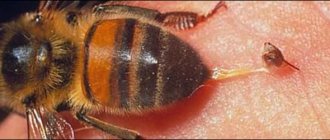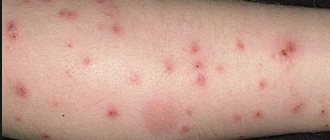What diseases do bloodsuckers infect?
In the tropics, after being bitten by parasites, a huge number of people die from the infections they carry. Blood-sucking insects lead to severe damage to internal organs, paralysis, and death. Not all infections that tropical mosquitoes infect people have been treated with effective medications.
Mosquitoes carry the following diseases:
- Malaria. It is spread by female malaria mosquitoes, which are found not only in the tropics, but also in the south of Russia.
- Yellow fever. The disease is carried by mosquitoes living in Africa and Central America. No special therapeutic drugs have been developed against it yet. In severe cases, yellow fever causes the death of the patient.
Bloodsuckers also infect people:
- dengue fever;
- Japanese encephalitis;
- chikungunya.
People vacationing in tropical countries need to be careful: use mosquito repellents and seek medical help at the first symptoms of the disease. If the illness appeared after returning to Russia, then it is necessary to warn doctors about vacationing in the tropics.
Mosquitoes, flies and HIV infection - magazine #75
Mosquitoes, flies and HIV infection
Summer is the time for vacations, holidays, active recreation... But it is in the summer that we often remember Pushkin’s famous lines:
Oh, summer is red! I would love you If it weren’t for the heat, the dust, the mosquitoes, and the flies.
Indeed: who among us does not poison life in nature with these harmful creatures? However, Alexander Sergeevich, with all his dislike for “mosquitoes and flies,” could hardly have imagined what fears they could give rise to in some of our contemporaries. One of the young people who underwent voluntary testing for HIV during a recent city campaign told us that he was well aware of the routes of transmission of this infection, and immediately confidently called mosquitoes its dangerous carriers. (Read about the action on pp. 11–13 and 15–17.) Our magazine has written more than once about whether mosquitoes (and insects in general) are “to blame” for the spread of this virus. Today we will again talk about how you can and cannot become infected with HIV/AIDS.
WHY CAN'T MOSQUITOES CARRY HIV INFECTION? At the beginning of the AIDS epidemic, there were concerns that HIV infection could be transmitted by mosquitoes, bedbugs and other blood-sucking insects. However, studies conducted in a number of countries have proven that even in areas with a high incidence of HIV infection and a large number of bloodsucking insects, no cases of infection through this route have been found. If this mode of transmission were possible, the geographical spread of the epidemic would be completely different from that which exists now. When a mosquito bites a person, it injects not the blood of the previous victim, but its own saliva. Diseases such as yellow fever and malaria are transmitted by certain types of mosquitoes because the pathogens that cause these diseases can live and reproduce in their saliva. But HIV is not able to multiply in the body of a mosquito or any other bloodsucker, therefore, even if it enters the body of an insect, it does not survive and cannot infect anyone. It is also known that a well-fed (blood-drinking) mosquito does not bite twice. In addition, in the mosquito's proboscis there is a valve-like device through which blood can flow only in one direction - inward, so that the mosquito cannot release the blood of the person it has bitten out. So, mosquitoes, bedbugs, lice and other insects cannot tolerate the human immunodeficiency virus and do not get AIDS. However, the myth of the “mosquito threat” plays its detrimental role, creating, on the one hand, an atmosphere of panic and irrational fear of HIV, and on the other, fatalism and hope “at random”: why change your sexual behavior if at any moment you can bite a deadly mosquito? By the way, studies have shown that people who do not know their HIV status are more prone to risky behaviors. Let us remember: HIV is the human immunodeficiency virus. It causes a disease called AIDS - acquired immunodeficiency syndrome, or AIDS (Acquired ImmunoDeficiency Syndrome).
HOW CAN YOU GET HIV INFECTION?
- Intravenous drug use using a shared syringe or drugs contaminated with HIV (95% chance of infection from a single injection).
- During unprotected sexual intercourse (between men, during anal sex, during normal sexual intercourse).
- During blood transfusions.
- From mother to child during pregnancy through the placenta and during breastfeeding through milk.
HOW IS HIV NOT TRANSMITTED? HIV is not transmitted through:
- saliva,
- tears,
- sweat.
There is no evidence that HIV can be transmitted through airborne droplets, water or food, or through social contacts at home or other places.
WHY IS HIV NOT TRANSMITTED THROUGH KISS? In saliva, the virus is present in extremely low concentrations, insufficient for infection. Hundreds of thousands of cases of HIV transmission have been recorded in which the source of infection has been accurately identified. If saliva posed a real risk, among these hundreds of thousands there would be a significant proportion of people who acquired HIV from coughing, sneezing, or kissing. However, experience shows that there is no such risk of HIV infection. Saliva can only be dangerous if blood is visible in it. If there is no visible blood in saliva, urine and other secretions, HIV infection is impossible.
CAN HIV SYMPTOMS APPEAR THE NEXT DAY AFTER A DANGEROUS RELATIONSHIP? Symptoms of HIV infection cannot appear the day after questionable contact. The period of time after which these symptoms appear depends on the state of health, immune system, etc. The presence of a virus in a person’s body can be judged by the results of the analysis. It will be considered positive if antibodies to the HIV virus are detected in a person’s blood. Since the analysis does not detect the virus itself, but antibodies to it, the examination must be carried out when the body has produced a sufficient amount of them, that is, so much that the test system can detect them. It takes time to develop antibodies – from three months to six months. This period, when the virus is already in the body, but antibodies have not yet been produced in sufficient quantities and are not detected by test systems, is called the “window” period. An examination during this period may show a negative result even if the virus is present in the body. Thus, in order to be sure of a negative test result (i.e., to ensure that infection has not occurred), it is necessary to repeat the examination six months after the “dangerous” situation or sexual contact. Manifestations of HIV infection superficially resemble symptoms of other diseases. Therefore, the most correct way is to take a blood test for HIV infection. This testing is anonymous and free.
DOES A CONDOM PROTECT FROM HIV? Proper use of a high-quality condom with every sexual act is reliable protection against HIV transmission.
IS THERE A TREATMENT FOR HIV POSITIVE PEOPLE? Today, HIV infection is incurable. However, for HIV-positive people there is special therapy that helps maintain the required number of immune cells in the blood. By taking this therapy, the patient can lead a long, full life, almost the same as an HIV-negative person. For Russian citizens, therapy is free and is prescribed by a doctor at the Center for Prevention and Control of AIDS, if necessary for health reasons. Not all people living with HIV need therapy: in the early stages, the body itself maintains the necessary level of immunity.
CAN HIV POSITIVE PARENTS HAVE HEALTHY CHILDREN? Yes, HIV-positive parents can have healthy children. If only a man has HIV infection, then in some cases a method is used to purify sperm from HIV so that the infection is not transmitted during conception to the woman and subsequently to the child. This method reduces the risk of transmission of the virus to negligible. If a woman has HIV infection, measures can be taken to prevent transmission of the virus to the child. During pregnancy, if necessary, the woman will be prescribed special therapy; during childbirth, doctors will provide special conditions for the woman in labor. Then the probability of having a healthy child can be 97–98%.
DO I NEED TO TAKE AN HIV TEST? This largely depends on how you answer the following questions.
- Have you injected drugs?
- Have you had unprotected sex with multiple partners, anonymous partners, or men who have sex with other men?
- Have you had sex in exchange for money or drugs?
- Have you ever been diagnosed with hepatitis, tuberculosis or a sexually transmitted disease? Have you been treated for similar diseases? If you answered yes to any of the questions, you definitely need to get tested for HIV.
Recommended sites on the topic: www.stopspid.ru, www.aids.ru, www.aids.bookmed.info
Once again in the summertime many people face the question – what if i get infected with HIV or some other disease via mosquito bites?
When the epidemic was only beginning there were concerns that the virus may be transferred by bloodsucking insects. Soon a research has shown that this is not possible, because even in countries with high HIV prevalence and huge amount of mosquitoes and other insects there has been no single case of such virus transmission. If it wasn't so, then the world map of HIV prevalence would be much different. Besides, mosquitoes don't bite twice if the first bite gave blood. When biting they inject their saliva, not blood, and the blood that was once sucked cannot go the other way in the mosquito's organism. Neither can you get infected with HIV through kisses. Saliva of a person with HIV contains too little copies of the virus, such amount can never be enough for contraction. Hundreds of thousands of HIV cases have 100% disclosed route of infection, and if virus transmission through kisses was possible it would be among them. Now, once again we repeat the basic facts about HIV. AIDS (acquired immunodeficiency syndrome) is an incurable disease caused by human immunodeficiency virus (HIV).
WAYS HOW HIV CAN NOT BE TRANSMITTED:
- Through shaking hands and hugs
- Through kisses
- When sharing same bathroom and toilet, swimming in a pool, etc.
- When sharing utensils
- Via air and using the same office equipment
- Through insects' bites
A person may not be aware that he or she is infected with HIV, and that is why everyone should undergo HIV testing and know his or her HIV status. To do this one has to address local polyclinic, women's consulting center or the City AIDS Center, as well as some city hospitals. Testing in the AIDS Center is anonymous.
HOW HIV CAN BE TRANSMITTED:
- Through unsafe sex
- Through intravenous drug use
- From mother to child
At the present time no cure exists to treat HIV/AIDS, only antiretroviral therapy, which can prolong one's life. Therefore, the best treatment of HIV so far is prevention, and you should never forget about it.
Do mosquitoes carry HIV?
When AIDS began to spread, it was suggested that the immunodeficiency virus could be transmitted by blood-sucking insects. But further research did not confirm this information.
Mosquitoes cannot transmit HIV infection because the virus cannot live outside the human body. If an insect sucks the blood of a sick person, the viruses will immediately die in his stomach.
Some people fear that a mosquito that has drunk the blood of a sick person will inject it into a healthy person. This is not possible for the following reasons:
- Having sucked the blood of one person, the female mosquito does not fly to bite another. She hides in a secluded place and digests food for several days, and then looks for a pond to lay eggs.
- Even if we assume that after swallowing the blood of a sick person, a mosquito will immediately fly to another, it will not be able to inject blood into him. The bloodsucker's proboscis works in one direction. The insect injects its victim only saliva, in which the immunodeficiency virus cannot exist. In this way, it differs from malaria plasmodia, which pass from the insect’s stomach to its salivary glands, and then, together with saliva, enter the human body and cause disease.
Several studies have been conducted on the transmission of AIDS by blood-sucking insects, but they have not confirmed this possibility. The immunodeficiency virus spreads sexually, through the blood, and passes through the mother's placenta to the child. There are no other routes of transmission.
How is hepatitis usually transmitted?
Hepatitis is a disorder of the liver. Many doctors in all developing countries are puzzled by the prevention of this disease. And first of all, it is necessary to take into account contact with biological fluids that may contain the unfortunate virus.
Most often, hepatitis is contracted after unprotected sexual intercourse, when using the same syringe, when applying tattoos to the skin, when piercing the earlobes, during a blood transfusion, or during surgery. In addition, a newly born child can also receive hepatitis viruses from its mother.
There is also a considerable chance of contracting hepatitis if the blood of a sick person comes into contact with the skin. The risk of infection increases significantly among those who lead a chaotic lifestyle. There is a high probability of illness in children born in those regions where the incidence rate is quite high.
Health care workers often become infected with hepatitis, as they often have to come into contact with the blood of patients. Well, drug addicts are most susceptible to this disease.
After all, if they have an irresistible desire to get another dose of a narcotic substance, as a rule, everything is indifferent. They will not think ahead and take care of their health. The main thing for them is to get a “high” right here and now. Therefore, they can even use the same needle that has already been used by others.
From all of the above about hepatitis, we can conclude that all methods of transmission of this disease are based on contact with blood. That is why many people fear that a mosquito can become a carrier of the disease, which only does is try to get blood at any cost.
Have there been any cases of infection?
But just as in the case of HIV, there has not been a single case of human infection with hepatitis through insects in world medical practice. If a mosquito were capable of transmitting hepatoviruses, then a global epidemic would have started long ago all over the world. But this, fortunately, does not happen.
The mosquito does not inject blood
The fact that a mosquito, even directly interacting with blood, does not transmit viruses to a healthy person can be explained in the same way as in the case of HIV. After all, when he bites, he injects under the skin of the victim not blood, which is extremely important for him, but his own saliva.
The danger of mosquito bites
In Russia, cases of dengue or malaria are rare. The only danger mosquito bites pose is allergic reactions. They are caused by insect saliva, which contains substances that prevent blood clotting.
For most people, mosquito bites cause itching and small swelling. In babies under one year of age and in people with a strong tendency to allergies, blisters form, accompanied by itching and fever. In severe cases, anaphylactic shock is possible.
It is impossible to contract AIDS through a mosquito bite. If the parasite sucks the blood of a sick person, the virus will die in his stomach. Even if a person kills a mosquito with his bare hand, he is not in danger of getting sick.
Can you get infected with HIV through a mosquito bite?
Experts unanimously declare: this method of transmitting a terrible disease is absolutely excluded. To the question of whether you can become infected with HIV from a mosquito bite, there is a completely reasonable answer and compelling arguments. It is worth remembering that it is impossible to become infected with HIV through contact with ticks and other insects.
It is important to know that during the bite period a mosquito does not inject the blood of the previous bite into the tissue of the second.
And the virus itself dies in the external environment in a matter of minutes, even without exposure to bleach or elevated temperature.
When a mosquito bites, it injects only its own enzymes into the wound so that when it sucks out its precious liquid, it does not coagulate.
Blood drinking mosquito
This does not apply to contracting malaria. This kind of infection gets into the mosquito’s saliva.
By the way, mosquitoes are not carriers of the AIDS and HIV viruses. In addition, scientists know for sure: a well-fed mosquito will not attack a new victim until it has digested what it has already drunk.
And one more important argument: many years ago, epidemiological studies were carried out in Africa.
Hundreds of insects that had bitten people previously infected with HIV and AIDS patients were taken for analysis. As a result, it turned out that not a single case of infection occurred.
Conclusion
So is it possible to become infected with HIV through a mosquito bite? The answer is clear - no.
Doctors around the world agree: those microscopic drops of blood that fall into the stomach of a mosquito from a sick person are not able to contain the dangerous virus.
In addition, it is known for sure that a “drunk” mosquito will not look for a new victim until it has digested what it has drunk.
So you should be calm about insects, but still take the necessary precautions.
Can you get HIV from a mosquito bite or from a dentist?
.
We are accustomed to thinking that HIV infection can only occur in those people who fall into the category of “vulnerable groups” (experienced drug users) or who practice promiscuity - multiple sexual relationships, as well as non-traditional sexual orientation.
Many are still convinced that AIDS is just a horror story and that such a disease does not exist. Unfortunately, stubborn statistics tell a completely different story. According to experts, HIV infection has now spread beyond vulnerable groups. Today, the problem of HIV infection concerns everyone.
And such statements again come from statistics. Currently, more than 824 thousand PLWHA (persons living with HIV/AIDS) are registered in Russia. Moreover, one hundred thousand of them were in 2015 alone. Every year, an increasing number of people are diagnosed with HIV infection - quite socially prosperous, 30 - 40-year-old married people. Unfortunately, not all infected people know about their status. A person can live with the virus in the blood for some time without knowing about it. And infect others. Together with experts, we are understanding how the human immunodeficiency virus is transmitted.
MAIN ROUTES OF TRANSMISSION
1. Unprotected sex
The share of sexual heterosexual transmission of HIV on average in Russia is now 40.3%. And, for example, according to the chief physician of the Irkutsk Regional Center for the Prevention and Control of AIDS and Infectious Diseases (AIDS Center) Yulia Plotnikova, 76% of patients identified since the beginning of 2021 in the Irkutsk region received the virus due to unprotected sex.
Moreover, women are infected from men three times more often.
“This happens due to biological and anatomical features,” comments Evgenia Zhukova, head of the epidemiology department of the Moscow Region AIDS Center. “In addition, sexually transmitted diseases and inflammatory diseases of the genitourinary system increase the transmission of infection.
2. From infected mother to child
“This is the so-called vertical path, from mother to child during pregnancy, childbirth and breastfeeding,” says Evgenia Zhukova. — If timely prevention of mother-to-child HIV transmission with antiretroviral drugs is not carried out, the risk can be up to 50%. If three-stage prophylaxis with antiretroviral drugs is followed during pregnancy, childbirth and another 4 weeks after the birth of the baby, as well as by excluding breastfeeding, the risk of transmission of infection is reduced to 1-2%.
Indeed, thanks to the prevention of vertical transmission in our country, the risk of such transmission of HIV infection from mother to child was 2.2%, which corresponds to the best international experience.
3. When using shared syringes
This route of infection was the most “popular” in 1990-2000, when young people massively tried injecting drugs. Now the share of this route of infection is decreasing, but the likelihood of HIV infection through syringes and shared containers is still high.
In the 1990s, HIV was most often transmitted through shared syringes. But even now this danger still exists.
Photo: Oleg RUKAVITSIN
4. In case of transfusion of contaminated blood
Such cases are now extremely rare. Because special safety measures have been introduced when collecting blood and its components, and all donors undergo mandatory testing for HIV.
5. Through manicure and shaving accessories
The likelihood of infection through personal hygiene items that can injure the skin or mucous membranes (including a toothbrush), although small, is still possible. It all depends on the amount of infected blood that could get on these objects.
6. At the tattoo and piercing parlor
The common tools used in a tattoo parlor are also a risk area. It is very important that all tools in such salons, including manicure studios, are processed without fail. In tattoo parlors, the virus can persist, including in containers with ink (which is used repeatedly, unlike disposable attachments on tattoo machines). The human immunodeficiency virus is very unstable in the external environment and quickly dies when properly processed.
AND HOW TO GET A VIRUS IS EXACTLY IMPOSSIBLE
1. When bitten by a mosquito
Numerous studies conducted on this matter clearly prove that this route of HIV infection is impossible. Just like when bitten by ticks, bedbugs and other unpleasant insects.
2. For sneezing and coughing
The amount of HIV sufficient for infection is contained only in certain biological fluids: blood, semen, vaginal secretions. You simply cannot become infected with HIV by sneezing and coughing.
3. When kissing and hugging
The fact that the virus is not transmitted through a handshake, hugs, or even kisses has been proven by many couples in which one partner is infected and the other is healthy.
“According to statistics, from 30 to 50% of HIV-positive patients live in so-called discordant couples, where one partner is positive and the other is not,” explains Evgenia Zhukova. — If an HIV-positive partner takes antiretroviral therapy, and the couple practices protected sex (with a condom), then such couples have a completely normal healthy relationship.
That is, hugging, greeting, kissing, and making friends with HIV-positive people is completely safe. But, unfortunately, this is the most persistent myth, which gives rise to a somewhat wary attitude in society towards people with HIV status. Because of this, unfortunately, many people, having learned that they have HIV, refuse to register and start antiretroviral therapy in a timely manner. But it can, if not rid an HIV-positive person of the virus, then provide him with a completely normal, fulfilling life. Indeed, with proper treatment, the amount of virus in the blood can decrease to undetectable.
Fortunately, the days when employers refused positions to infected people, when colleagues turned away and friends abandoned them, are becoming a thing of the past. Now the attitude towards HIV-positive people who receive support from the state and undergo treatment is slowly but surely changing. Read about this in our material.
4. When using shared dishes, towels, and clothes
Even if contaminated blood comes into contact with clothing or towels, the virus will be destroyed by ordinary washing or washing with detergent.
5. At the dentist's office
According to the President of the Russian Dental Association, Vladimir Sadovsky, in modern clinics they carefully monitor safety - all instruments are disinfected, surfaces are treated. Therefore, you simply have no chance of getting the virus in the dentist’s chair.
In modern dental offices, the safety and sterility of instruments is carefully monitored. Transmission of the virus under such conditions is reduced to zero.
Photo: Andrey KOPALOV
There are still many myths around the human immunodeficiency virus. They create fear, even panic. Especially those who find out that they are infected. And sometimes this panic prevents you from making the right decision. Namely, register and start taking medications. After all, only timely therapy will protect an HIV-positive person from developing AIDS and give many years of a fulfilling life.
Therefore, the Russian Ministry of Health pays great attention not only to the problem itself, the treatment of HIV-positive citizens, but also, first of all, to preventing the development of the virus.
“The participation of every citizen is important in solving this problem,” says Russian Health Minister Veronika Skvortsova . “Only a person’s responsible attitude towards their behavior, adherence to simple rules, as well as regular testing can protect against HIV infection and prevent its further spread. It is important to remember that today HIV is not a death sentence. Timely diagnosis and treatment allow an infected person to live a normal life, start a family, and be happy.
IMPORTANT
Every year in Russia more than 30 million people are tested free of charge, and this figure continues to grow.
Even if you are completely confident in all your partners, have never used drugs, have never had a blood transfusion, and always use only your own hygiene products, you still need to get tested for HIV.
Recently, cases of HIV transmission through sexual contact have been increasing. Therefore, it is very important that not only you, but also your partner knows your HIV status. Unfortunately, most HIV-positive people simply do not know that they are infected. And they infect others. Therefore, knowing your partner's status is no longer just a matter of trust. If a person is offended by your proposal to check your HIV status, think about it: will he take care of you and your health in the future?..
After all, you can take a free HIV test very simply and quickly: in community clinics, psychosocial counseling rooms and anonymous examinations in healthcare institutions and Centers for the Prevention and Control of AIDS. Detailed information on the website www.o-spide.ru
What diseases do mosquitoes carry?
Mosquitoes are not carriers of HIV and AIDS, but insects can infect people with other infectious diseases, and the infected do not even suspect this pathology transmission route.
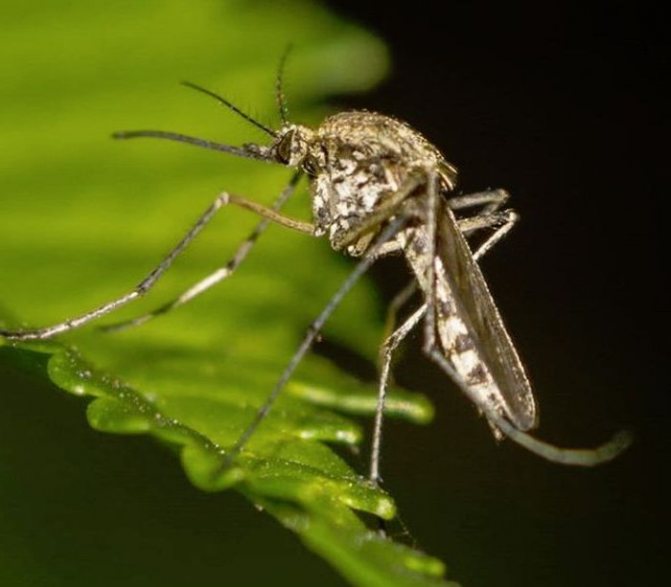
You can take them as a threat, but not HIV; only people are guilty of transmitting HIV
Malaria
The disease occurs with severe symptoms, including:
- feverish syndrome and malaise;
- headache;
- enlarged liver and spleen;
- increased sweating;
- diarrhea;
- joint pain;
- increase in general temperature;
- anemia;
- nausea and vomiting syndrome.
In addition, the disease is characterized by the appearance of specific rashes on the skin, urinary dysfunction, and disruption of the cardiovascular system.
Tularemia
The pathology is bacterial in nature and occurs with the following clinical picture:
- increased general temperature;
- malaise;
- headaches;
- dizziness;
- decreased appetite;
- decrease in blood pressure.
In some cases, ulcerative tumors form, gangrenous changes, abscesses, pneumonia, peritonitis, pericarditis, and meningoencephalitis develop.
Zika virus
Zika virus infection causes the following symptoms:
- mild headache;
- weakness and rapid fatigue;
- the formation of a macular or papular type rash on the skin, which itches; at the beginning of the development of the pathology, it forms on the face, later spreading to other parts of the body;
- muscle-joint pain, swelling in the area of small joints;
- hyperemia and inflammation of the conjunctiva;
- photosensitivity.
If pathology appears during gestation, the development of defects in the unborn child, for example, microcephaly, is possible.
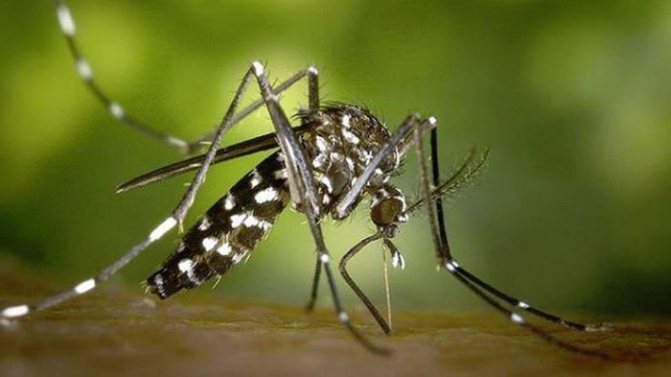
A thin proboscis can be a source of infection, because microbes are even smaller and more dangerous
West Nile virus
The infectious disease may occur without obvious symptoms or cause fever and/or West Nile disease. The first develops in 20% of cases of infection. Among the characteristic symptoms:
- headache;
- malaise;
- nausea and vomiting syndrome;
- skin rash;
- swelling of the lymph nodes.
West Nile disease occurs with an increase in general temperature, headache, dizziness, lightheadedness, convulsions and tremors of the limbs, muscle weakness, and paralysis.
Yellow fever
In most cases, the pathology develops asymptomatically or with the following symptoms:
- increase in general temperature;
- muscle and back pain;
- headache;
- loss of appetite;
- nausea and vomiting syndrome.
After 3-4 days from the onset of symptoms, they completely disappear.
Dengue fever
Primary infection of the body causes the following clinical manifestations:
- increase in general temperature;
- arrhythmia;
- musculoskeletal pain;
- anorexia due to loss of interest in food;
- nausea;
- dizziness;
- hyperemia of the eyes, face, throat;
- skin rash.
With repeated infection, hemorrhagic fever develops, which is more typical for people living in endemic areas. The symptoms are the same as for regular fever, supplemented by vomiting, petechial rash, decreased blood pressure, and blue discoloration of the epidermis.
Chikungunya
A viral infection manifests itself immediately with a sharp increase in temperature up to 40 degrees, severe headaches in the joints, muscles, nausea, fatigue, and skin rash.
In some cases, ocular, neurological, cardiovascular complications, and gastrointestinal consequences occur.
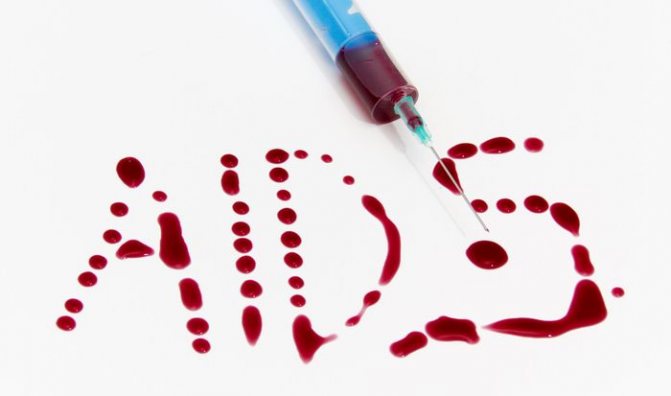
AIDS and HIV are blood infections, but the mosquito is not involved in this transmission, but it perfectly transmits other infectious diseases from which you can also die
Although mosquitoes are considered insect carriers of many diseases, this does not apply to HIV and AIDS. You can find out how to prevent the development of pathologies by consulting a doctor.
Probability of contracting HIV – who has the chance?
Anyone can become infected with HIV, but some of us are at greater risk.
Anal sex
This type of sexual intercourse is the most dangerous of all possible, regardless of the person’s gender.
The probability of infection among its lovers looks like this:
- the one being penetrated: 1.38%;
- for the one who enters: 0.11%.
The numbers are explained simply - for someone who plays a passive role, the thin mucous membrane of the rectum is sometimes injured, and for his partner, the virus can enter the body through the urethra, cuts, scratches or sores on the penis.
Vaginal sex
There are also risks for both participants here:
- in those who are penetrated: 0.08%;
- in those who penetrate: 0.04%.
Oral sex
The chance of infection is miniscule, but still not zero, and the greatest danger of transmission is through contact of the penis with the mouth. It is increased by the presence of ulcers on the mucous membranes or penis, other sexually transmitted infections, bleeding gums and menstrual blood.
The first signs and symptoms of HIV May 11, 20212781
Other options for intimate contacts
- Fingers: Even after repeated hand washing and nail trimming, there is still a tiny risk.
- Sex toys: It is possible to get the virus from sharing dildos, vibrators, and butt plugs . They must be thoroughly cleaned before each use and not shared with anyone.
Pregnancy
With breast milk, contractions and childbirth itself, everything is not simple. According to the World Health Organization, the chance of transmitting the virus to a child is 15-45% if the infected mother does not receive proper treatment.
WHO recommends that women breastfeed their babies only if they are taking therapy that reduces these risks to 5%.
Transmission through needles
Used syringes, especially on the needle, usually have some liquid remaining, including blood. The chance of infection when used together, according to the US Centers for Disease Control and Prevention, is 0.63%.

How is HIV transmitted?
In the vast majority of cases, people become infected with HIV through anal or vaginal sex and sharing needles and syringes with others, but these, of course, are not the only ways of infection.
The human immunodeficiency virus can only be transmitted through certain fluids that our body produces:
- blood;
- sperm;
- pre-ejaculate released from the erect penis, that is, not only during sexual intercourse, but also before it begins;
- rectal - those that are in our rectum;
- vaginal;
- and breast milk.
Margarita Nagibina,
Infectious disease doctor, Doctor of Medical Sciences, Medicine 24/7 clinic
“The most HIV particles are contained in the blood, so those who come into contact with it are at greatest risk. Simply touching such a liquid is not enough - in order for it to be transmitted from person to person, it must enter damaged tissue, the bloodstream or the mucous membrane of the genitals, rectum or mouth.”
HIV can be transmitted from an expectant mother to her baby during pregnancy, childbirth or breastfeeding, but thanks to modern treatment regimens this is becoming less common.
Very low risk of infection
– tiny, but it’s still
there
, via:
- Oral sex
, and bleeding gums, as well as any wounds in the mouth and genitals, increase this likelihood. - At work or at home
, the virus can be transmitted as a result of an injection with a needle or other sharp object. Yes, the chance is really slim, but it is there. - Blood transfusion or organ transplantation
: in civilized countries this is a huge rarity, but the risk - at least theoretical - still exists. - Deep kisses -
due to wounds in the mouth or bleeding gums, the likelihood of infection is not high, but not zero. - Tattoos and piercings
- there are no statistics on this type of infection, but there is a risk of transmitting the virus when using dirty needles and other instruments.

Infection with AIDS through sweat is only possible if there are wounds on the skin
To become infected simply through the sweat of an infected person, you will need 200 liters of his sweat, that is, this is another myth. Another thing is sweat plus a bleeding wound, and again for both participants in the process.
Is it dangerous to kiss someone who has HIV?
Experts say that, in principle, it was, of course, possible to become infected through a kiss. But only if the person managed to drink three liters of saliva from a virus carrier.
And yet such a case (the only one in which HIV was transmitted through a kiss) was registered in the United States. The presence of HIV in saliva rather than blood is a very rare occurrence. This is due to the fact that saliva protects itself, that is, the substances it contains are capable of destroying cells into which the HIV virus has penetrated. They eventually break down into components that pose no danger.
Infection through a kiss is possible if both partners have the slightest damage to the oral mucosa. That is, infection still occurs through blood, although it may be impossible to immediately guess this.
Why can't mosquitoes carry AIDS?
Can mosquitoes carry AIDS ? This issue was studied quite seriously when scientists first identified and described the disease. First of all, research was carried out in regions with high levels of disease and insect activity. As a result, it was revealed that neither mosquitoes, nor flies, nor other blood-sucking insects can be carriers. And if this were so, then the scale of the epidemic would be simply terrifying. After all, swarms of mosquitoes can travel vast distances in search of food.
Can you get HIV from a mosquito bite ? No, this is impossible for a number of reasons. Firstly, its proboscis is too small for hypothetically the droplets of infected blood remaining on it could cause harm to another person. Secondly, its structure does not allow it to be released back. The mosquito only sucks blood. And there can be no other options for the development of events.
Features of the mosquito's mouthparts
Whether HIV is transmitted through a mosquito bite is a common question on the Internet, although scientists have refuted this possibility. Let's look at everything sequentially. The proboscis is the mouthparts of a mosquito; its structure resembles a syringe needle. It is designed to pierce the skin of a person or animal. By the way, huge mosquitoes, which are often found in the forest or near bodies of water in the summer, do not bite at all; their mouths are not designed for this. They feed on pollen and nectar. Therefore, the common belief that large mosquitoes carry serious diseases is nothing more than a misconception.
Can a mosquito infect AIDS - if the insect bites through the skin and drinks blood, and its mouthparts look like a needle, theoretically? Even theoretically, he cannot do this. At the moment when the female mosquito bites the skin, she releases saliva, which has anesthetic properties. It is to this that a person experiences an allergic reaction, causing the bite site to itch and itch. Other bloodsuckers, including wasps or leeches, have a similar effect.
Moreover, the negative answer to the question of whether HIV is transmitted through mosquitoes is based on the structure of the insect’s oral apparatus itself. Only in appearance it resembles a needle. In fact, a mosquito's mouth consists of 6 separate chambers. At the same time, the upper ones, through which the insect consumes blood, and the lower ones, which serve to secrete saliva, are separated from each other and do not have a common cavity.
Is it possible to become infected with AIDS through a mosquito ? For the most part, the question arises from the fact that insects carry other dangerous diseases. The bottom line is that these viruses, including malaria, can remain active and develop in saliva. Namely, it is injected by a mosquito when it bites. Regarding acquired immunodeficiency syndrome, it can only be transmitted through blood. This virus does not live in saliva.
HIV infection and the digestive tract of mosquitoes
Do mosquitoes carry HIV in the blood they drink? Another common question relates to the blood that is directly in the mosquito and the risk of infection if the insect is killed. The rapid reproduction of the virus is the reason why its number in the human body does not decrease, but only grows without treatment. To replicate, it requires CD4+ cells. Once in the intestine of a mosquito, it does not encounter cells of this type, since the insect simply does not have them.
This is the answer to the question of whether mosquitoes are carriers of AIDS. No, they are not, because without finding cells in which to live and develop, the virus dies in the intestines of the insect. Its migration to the salivary glands or distribution throughout the body is impossible. The virus itself is digested along with the blood. And if you “slam” an insect that has previously bitten a person with HIV, this does not pose a threat to your health.
Low concentration of HIV in the carrier's blood
Is it possible to become infected with HIV through a mosquito bite ? We have already answered and analyzed this topic from different angles. But, blood-sucking insects have a risk of contact with carriers of the disease. And being frightened by the spread of the virus and its negative consequences, it is quite logical that you want to study all the risks. Including getting an answer to the question: can mosquitoes transmit HIV?








